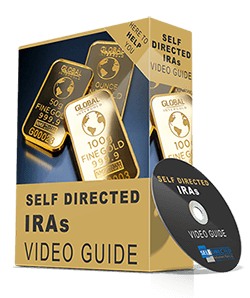Checkbook IRA Account
What is Checkbook IRA or Checkbook Control IRA
A Checkbook Control IRA (also called a Checkbook IRA) is a type of self-directed IRA that gives the account holder more control and flexibility over how they invest their retirement funds—without needing a custodian’s approval for every transaction.
A Checkbook IRA is essentially a Self-Directed IRA (SDIRA) that owns a Limited Liability Company (LLC).
You, the IRA owner, manage this LLC—usually as the manager—which means you get a checkbook (or debit card) linked to the LLC’s bank account. This setup allows you to write checks or make payments directly from your IRA LLC account to invest in things like:
-
Real estate
-
Private companies
-
Precious metals
-
Tax liens
-
Cryptocurrency
… and other alternative investments.
However, there are certain transactions that you, as the IRA holder, cannot carry out. This includes taking a salary from the LLC or making a distribution to yourself directly without letting the assets go through your IRA custodian to report the distribution.
So, a checkbook IRA is just the same as a traditional IRA except that it comes with the great investment flexibility and signing authority.
How to Set up a Checkbook IRA
01
The process of setting up a Self-Directed IRA begins with the drafting of a specialized Self-Directed IRA Operating Agreement in the specific IRA language, registering the LLC with the state, and then obtaining the EIN from the IRS. You may need to use the expert guidance of an experienced IRA LLC facilitator or a seasoned tax attorney to make sure that your business entity is specifically set up to meet your unique investment needs.
02
Open a checking account in the name of the LLC that you’ve just formed.
03
Fund your newly formed LLC by requesting your passive custodian to transfer the funds from your IRA to the new LLC bank account. More than one IRA accounts, such as Traditional, Roth, and SEP IRAs, can be used to fund the Checkbook IRA.
04
Do not mix your IRA and non-IRA funds and ensure that the business entity is established using the funds in your IRA as the Member-Owner.
05
Designate a manager who would be in charge of taking all the financial decisions concerning the IRA LLC (this can include you or anyone you choose).
06
The manager of the LLC is given special privileges to establish a checking account in the name of the LLC and has the authority to write checks and make self-directed investments in the name of the LLC.
-
07
Start investing once your Checkbook Control IRA checking account is funded.
How Does Checkbook Control IRA Work?
To gain “checkbook control,” you need to first set up an LLC through which your IRA can fund and invest. This means that not you, but your IRA is the investor of the LLC. In most cases, IRA holders have their IRA as the only member/investor.
At Self Directed Retirement Plans LLC, we use a passive custodian. We create an underlying LLC for each of our IRA clients. LLCs have managers and members. The LLCs we create will be manager-managed. The client will be the manager, and the member of the LLC will be the custodian (FBO) for the benefit of the IRA.
Once the new LLC is created, the manager of the LLC has to open a business checking account in the name of the LLC. To open the checking account, you need to present a copy of the Articles of Organization and the tax ID number (EIN) to the bank.
Once the LLC checking account is established, the custodian funds it by sending money from the IRA account to the LLC account. When the LLC account is funded, the client has “checkbook control” and can invest quickly without any permission from the custodian.
Advantages of Using a Self-Directed IRA LLC with Checkbook Control
-

Easier Control of Your Investments
When you have figured out the type of investments you want to purchase, you don’t need to fill out paperwork, wait for someone else to write the check or rely on your administrator to fund the purchase – you can take care of it yourself by writing the check or wiring the funds for the purchase.
Through your LLC, you can plan on investing in private shares, multiple properties, precious metals, or tax liens.
Self-Directed IRA LLC allows managers to have true control over their investments. This can be an advantage with investments that have time restraints, such as items on auction.
-

Lowers the Transaction Fees
If your IRA isn’t an LLC, every transaction is handled by your IRA custodian, and that racks up unwanted fees. When your IRA is an LLC, you, as the account holder, do not have to go through the IRA custodian for every transaction. Although you still need to report your IRA transactions to your custodian, you are charged for one interaction rather than multiple.
-

Checkbook Control over Retirement Funds
A Checkbook Control IRA is manager-managed and not member-managed. As the LLC manager, you have full control over making any investments that are not prohibited under the IRS regulations. Checkbook Control IRA investment purchases are usually made by writing a check from the LLC checking account in the name of the LLC.
While the IRA LLC has many advantages, it has a few risks too. So, before you decide to set up an LLC, do your due diligence and take time to learn about the potential risks and the costs you are responsible for paying. These items can be the annual state-required fees, tax requirements, registration availability within your state, and member limitations.
The Do’s and Don’ts of Checkbook Control IRA
When you are investing in alternative investments like precious metals, promissory notes, real estate, private placements, or tax liens, it is important that you familiarize yourself with the rules and regulations of checkbook IRA.
The Do’s
- Set up the checkbook IRA account in the name of the LLC and not in your name.
- Be sure to use the LLC EIN (employer identification number) for opening the checkbook IRA bank account.
- Make sure all checkbook IRA investments are titled in the name of the LLC and not in your personal name.
- All the investment expenses that are associated with assets in your checkbook IRA must be paid using the funds in your checkbook IRA. Do not use your personal funds to pay for property taxes, repair costs, or property insurance for a real estate property that is linked to your checkbook IRA.
- Deposit all your gains in your checkbook IRA bank account.
- Make all your annual contributions to your self-directed IRA first and not to your checkbook IRA.
The Don’ts
- A disqualified person is not allowed to extend any immediate credit nor receive any immediate benefit from the IRA.
- Disqualified persons are generally the IRA account owner, spouse, children, grandchildren, parents, grandparents, and their respective spouses.
- If the IRA benefits from a disqualified person or if a disqualified person benefits from the IRA, it would be a prohibited transaction.
- There are three types of investments not allowed inside your self-directed IRA:
- Life Insurance Contracts – however, certain annuities are allowed
- Collectibles– such as rugs, classic cars, stamp collections, etc.
- Shares of an ‘X’ Corporation– your plan is not a person but a business entity
Examples of Self directed ira prohibited transactions
Your IRA is allowed to purchase a rental property. Your daughter would like to pay rent and live there. She is a disqualified person and therefore it would be a prohibited transaction. However, your niece indicates she would like to live and pay rent. Since she is not a disqualified person, it is permissible and not a prohibited transaction.
Your son would like a loan from your Self-Directed IRA to help with college expenses. Again, he is a disqualified person so your IRA should not make the loan. Your brother also asks for a loan – for any purpose – he is not disqualified therefore your IRA can make the loan.



